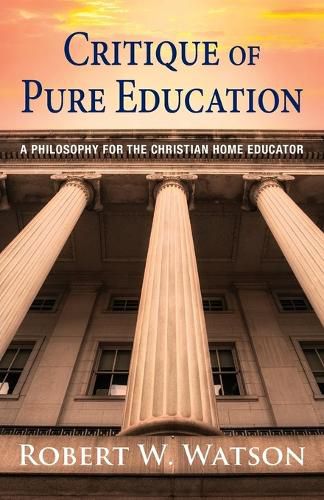Readings Newsletter
Become a Readings Member to make your shopping experience even easier.
Sign in or sign up for free!
You’re not far away from qualifying for FREE standard shipping within Australia
You’ve qualified for FREE standard shipping within Australia
The cart is loading…






This title is printed to order. This book may have been self-published. If so, we cannot guarantee the quality of the content. In the main most books will have gone through the editing process however some may not. We therefore suggest that you be aware of this before ordering this book. If in doubt check either the author or publisher’s details as we are unable to accept any returns unless they are faulty. Please contact us if you have any questions.
Pure education prepares students to be statesmen for central, state, and local governments, the finest scholars for colleges and universities, and other leaders in society. Many of the fine merits of this book center on revealing the actual foundation of American schools and supporting a comprehensive view of instruction that transmits ideas and not just processes. This book plainly explains why there is no excellence in American schools and provides a blueprint for students to rise above mediocrity. According to the author, pure education exists only in a familial context where students are considered unique. Since they ignore the unique gifts of individual children and promote the idea of the "average" student, the public schools do not educate, but merely create uniformly trained workers for the power elite in America. If education is to survive in America, then home schools must be equipped with this vital critique to provide explicit substance while complementing parental instincts.
Included as an appendix in this third edition of Critique of Pure Education is a thought-provoking essay about education in the United States, titled "The Educator and Cultural Reclamation," written by Dr. James E. Kibler, author, poet, and professor of Southern literature at the University of Georgia, Athens.
Parents who are concerned about the proper education for their children must read this book, because the well-being of their children depends upon it.
$9.00 standard shipping within Australia
FREE standard shipping within Australia for orders over $100.00
Express & International shipping calculated at checkout
This title is printed to order. This book may have been self-published. If so, we cannot guarantee the quality of the content. In the main most books will have gone through the editing process however some may not. We therefore suggest that you be aware of this before ordering this book. If in doubt check either the author or publisher’s details as we are unable to accept any returns unless they are faulty. Please contact us if you have any questions.
Pure education prepares students to be statesmen for central, state, and local governments, the finest scholars for colleges and universities, and other leaders in society. Many of the fine merits of this book center on revealing the actual foundation of American schools and supporting a comprehensive view of instruction that transmits ideas and not just processes. This book plainly explains why there is no excellence in American schools and provides a blueprint for students to rise above mediocrity. According to the author, pure education exists only in a familial context where students are considered unique. Since they ignore the unique gifts of individual children and promote the idea of the "average" student, the public schools do not educate, but merely create uniformly trained workers for the power elite in America. If education is to survive in America, then home schools must be equipped with this vital critique to provide explicit substance while complementing parental instincts.
Included as an appendix in this third edition of Critique of Pure Education is a thought-provoking essay about education in the United States, titled "The Educator and Cultural Reclamation," written by Dr. James E. Kibler, author, poet, and professor of Southern literature at the University of Georgia, Athens.
Parents who are concerned about the proper education for their children must read this book, because the well-being of their children depends upon it.